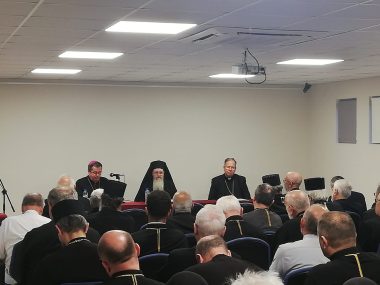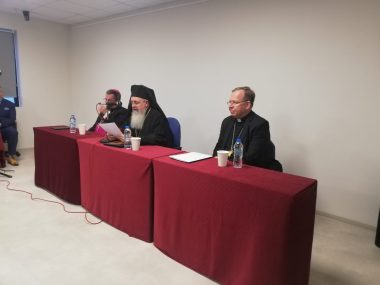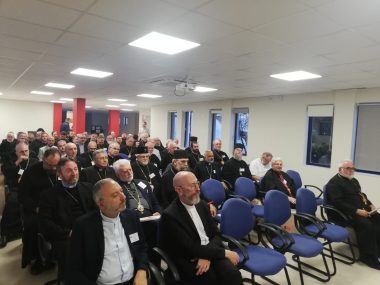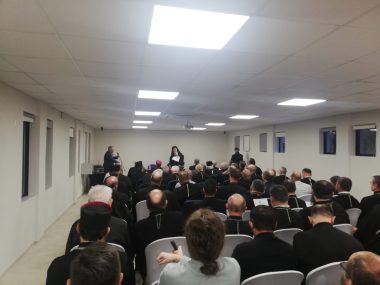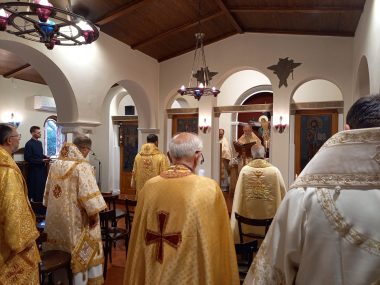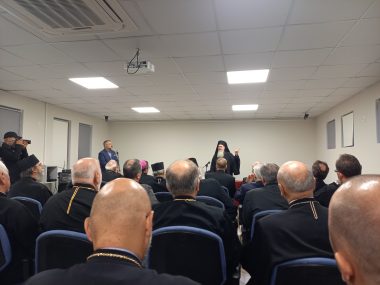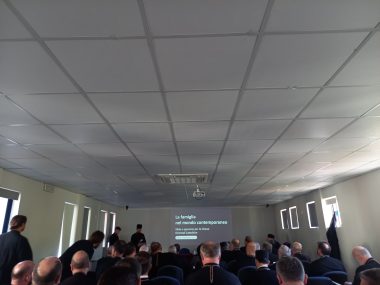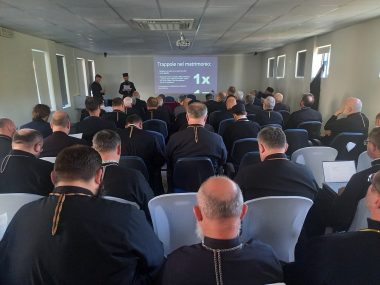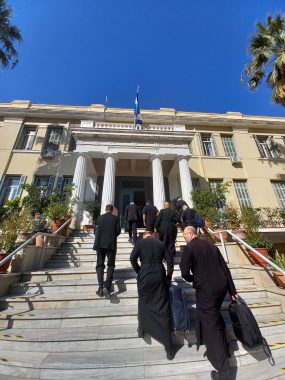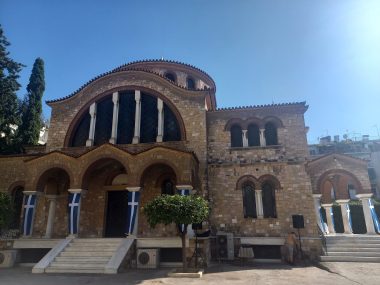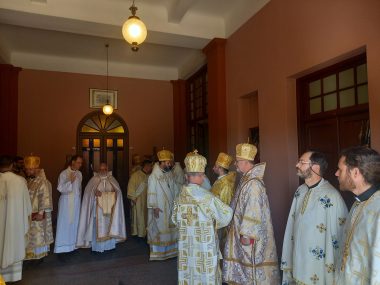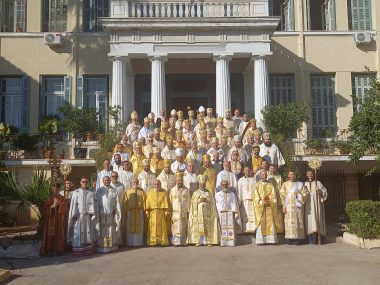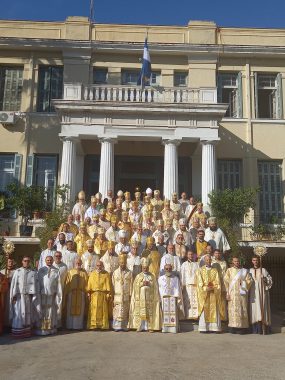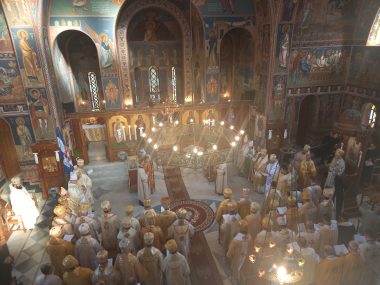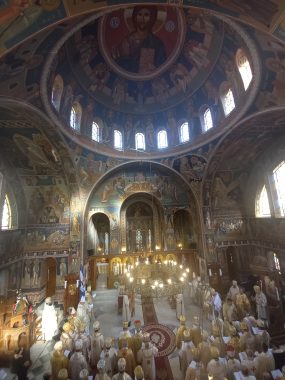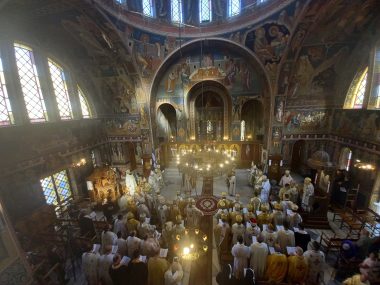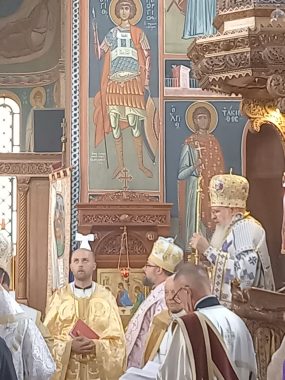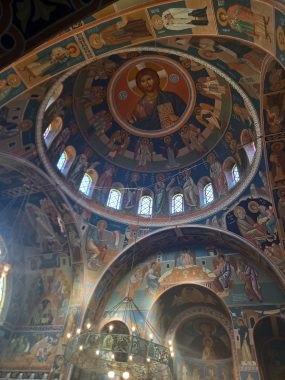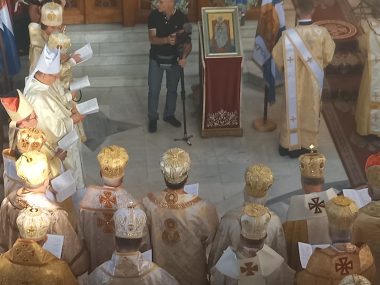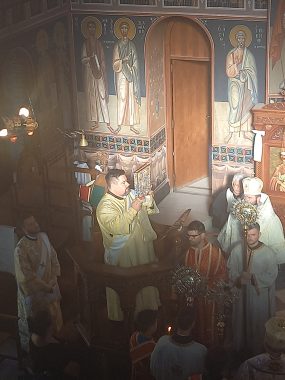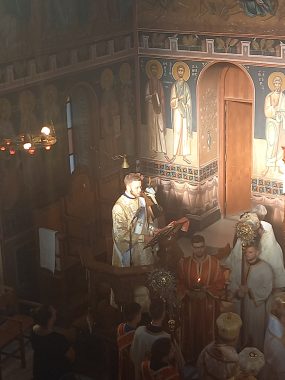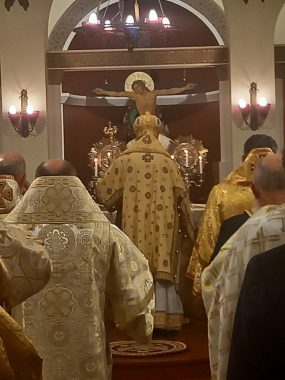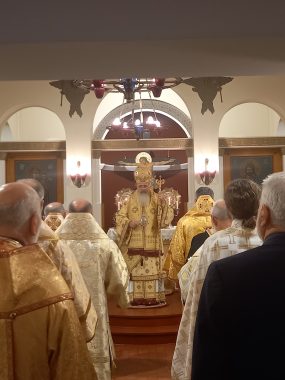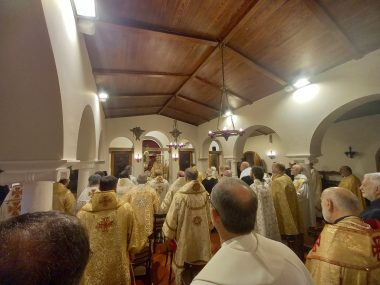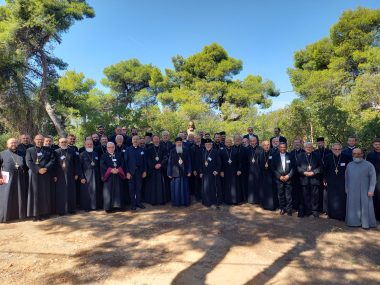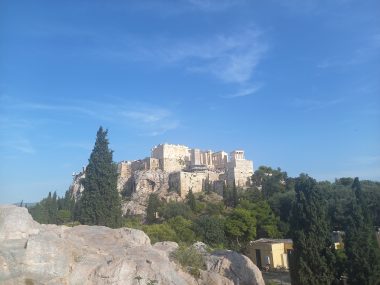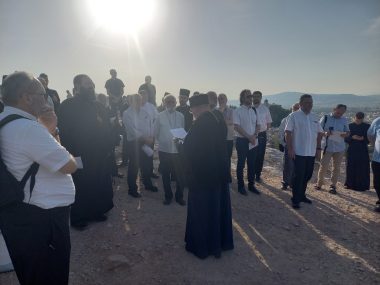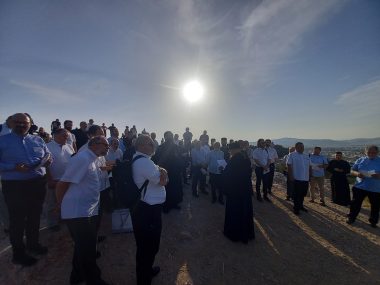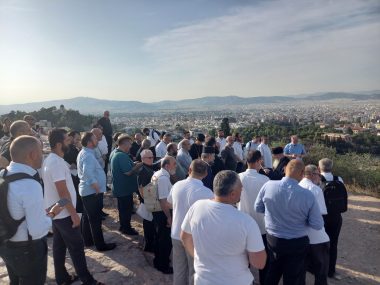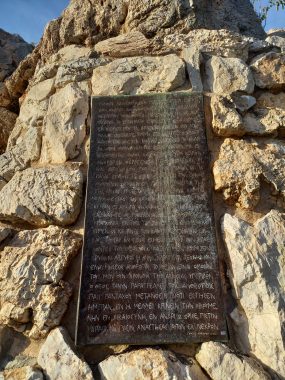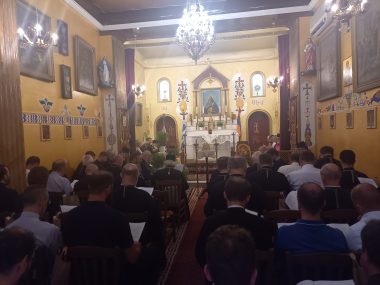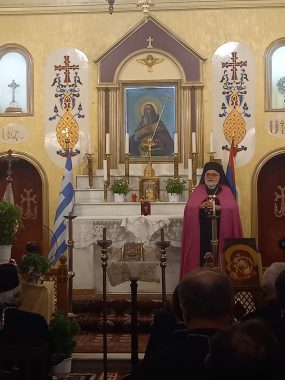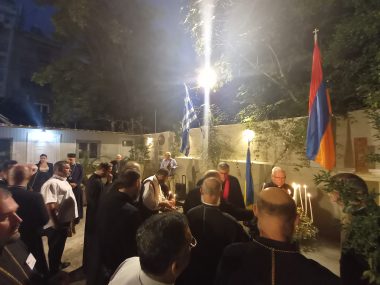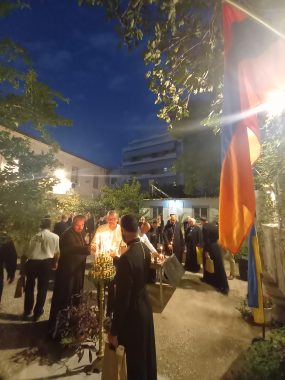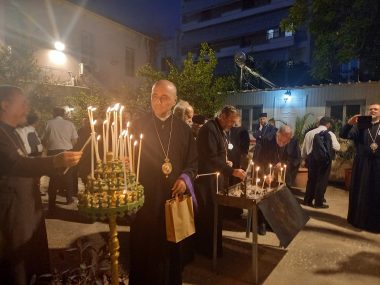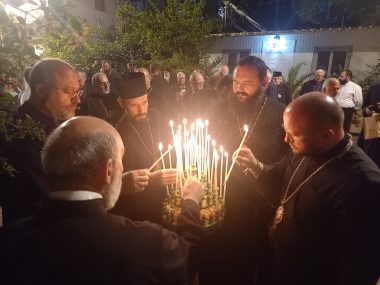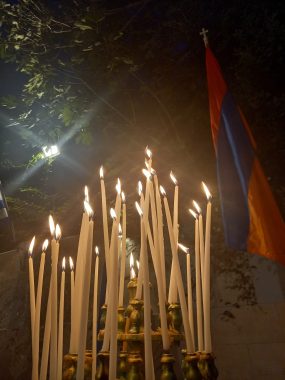The annual meeting of the Eastern Catholic Bishops of Europe took place in Athens, Greece, from 18 to 21 September 2023, entitled: “The Family in the context of the Eastern Catholic Churches in Europe”, on the invitation of His Excellence Manuel Nin i Güell, Apostolic Exarch for Catholics of the Byzantine Tradition in Greece and of Msgr. Joseph Bezazian, Apostolic Administrator of the Armenian Catholic Ordinariate in Greece.
The meeting was attended by more than 60 bishops and priests representing the Eastern Catholic Churches of Ukraine, Romania, Hungary, Slovakia, Bulgaria, Serbia, Croatia, Germany and the Scandinavian countries, Armenian Greek and Byzantine, Belarus, Cyprus, Italy and representatives of the Syro-Malabar Church and the Syrian Catholic Church in its European diaspora. Also present were the Apostolic Nuncio to Greece, H.E. Msgr. Jan Romeo Pawłowski, the CCEE President, H.E. Msgr. Gintaras Grušas and Rev. Michel Jalakh, Secretary of the Dicastery for the Oriental Churches.
In his inaugural address, Bishop Manuel Nin recalled the 100th anniversary of the arrival of Bishop George Calavasis from Constantinople to Athens, emphasising that the Greek Exarchate has expanded “in recent decades with two other ethnic and especially ecclesial realities: the faithful of the Chaldean tradition from Iraq and Syria and the Ukrainian faithful of the Byzantine tradition. In a single ecclesial reality with no distinctions, no grades, no privileges, but we are all one in Christ”.
Hoping that the days of prayer, reflection and sharing would be “for all of us, truly synodal because we will walk with Christ, the only Lord of our lives and of our Churches”, he concluded his speech with “a special remembrance for the Catholic Church of the Byzantine tradition in Ukraine and for all the Ukrainian people at this time of unjust war and enormous suffering”.
Presenting the bishops with the current problems experienced by Eastern Catholic families was H.E. Msgr. Milan Lach, Auxiliary Bishop of the Eparchy of Bratislava.
In the society of today, the family everywhere faces unimaginable pressure, the prelate said. “There is a struggle for the family. If the family survives, society survives. If the family does not survive, society does not survive either.”.
“The function of the family – he added – is to enable each of its members to become a mature person who has a clear sense of his or her own identity and, consequently, is capable of intimacy”. As a “unique and unrepeatable work of God, each person must recognise and develop this uniqueness within him/herself”. And since no one can build his identity in solitude, but rather has need of others to realise it, he has in the family the first and privileged place that allows him to build his identity. A united family, where everyone reserves time for each other, lives in dialogue and enables its members to deal with the many situations of crisis and conflict, and cope with any dependencies that disrupt the family.
With this in mind, accompanying families must be one of the Church’s priorities. A community must be created in the parish for young families so that they do not find themselves alone after marriage to face the problems and challenges of life as a couple. And he concluded: “in the Eastern Churches, a model to inspire love in our families can be found in the Holy Trinity, which is the love of the Divine Persons towards each other”.
Regarding the relationship between the bishop and married clergy, Deacon János Nyirán of the Metropolitan Church of Hajdudorog addressed the Assembly.
Married, a teacher and father of five children, the Hungarian proto deacon explained the many problems and challenges that also face the families of priests. Very sensitive for clerics are the relationship with money and the use of time. What standard of living can a married priest afford? What are the financial demands on his family? What example should they give for the faithful? And again, how to make good use of time? How much time should a married priest spend with his family? How to ensure that the cleric does not neglect his spirituality? These are just a few of the questions against which a priest, and also his bishop, must measure himself against every day as he solicitously accompanies the presbyterate entrusted to him.
Even more delicate are the problems that can arise in the life of a priest related to addiction, adultery, divorce and abuse, especially of minors. How to help the family of a cleric in difficulty? What to do when the marriage is in crisis? How to detect cases of abuse and act promptly? Among the solutions indicated are the promotion of ongoing training initiatives, psychological accompaniment by qualified experts, and the formulation of mandatory codes of conduct for all. It is also very important to take care of the wives of priests and to accompany their children’s training and education.
H.E. Msgr. Bohdan Dzyurakh, Apostolic Exarch for Ukrainians of the Byzantine Rite in Germany and Scandinavia, recounted “The response of the Catholic Church in Europe to the tragedy of the Russian war against Ukraine”. “Today, Ukrainian families are suffering the heaviest and most painful blow of this inhuman and barbaric war. 14 million people, mostly women, children and the elderly, have been forced to flee their homes and places of origin. The war has struck at the very heart of Ukrainian society, and this heart is the family”. For this reason, Bishop Bohdan continued, the spiritual, psychological and social support and assistance of families will continue to be the main focus of the “of our synodal meetings and all our pastoral work in Ukraine and abroad”. He then expressed gratitude for the solidarity of the large Christian and European family: “We are standing and, I am firmly convinced, we will withstand today’s trials because we are sustained by the power of faith and the grace of God. We are also sustained by the support and solidarity of Europeans, especially our brothers and sisters in faith and millions of people of goodwill”. Finally, he presented the work of the Catholic response for Ukraine, also known as the CR4U initiative. Already at the beginning of March 2022, representatives of the main Catholic humanitarian organisations formed a ‘Catholic Response for Ukraine’ (CR4U) working group to coordinate their actions in the affected region. CR4U is coordinated by the International Catholic Migration Commission (ICMC), which brings together the migration offices of the world’s Bishops’ Conferences and works closely with the Vatican’s Dicastery for the Promotion of Integral Human Development.
The Divine Liturgy in the Byzantine Catholic Cathedral of the Most Holy Trinity in Athens, the celebration of Vespers with a prayer for the Armenian martyrs and peace in Ukraine at the Armenian Catholic Ordinariate, together with many other moments of prayer and fraternal agape, accompanied the work of these days. Including intense moments of sharing, the fruit of the minorities that enrich the Church, it was a fully synodal experience to walk together towards Christ.
At the conclusion, the theme of the next meeting was decided: “The humanity of the priest. The relationship between the bishop and his clergy”. The meeting will take place in Oradea, Romania, from 17 to 19 September 2024.
Athens, 22 September 2023


